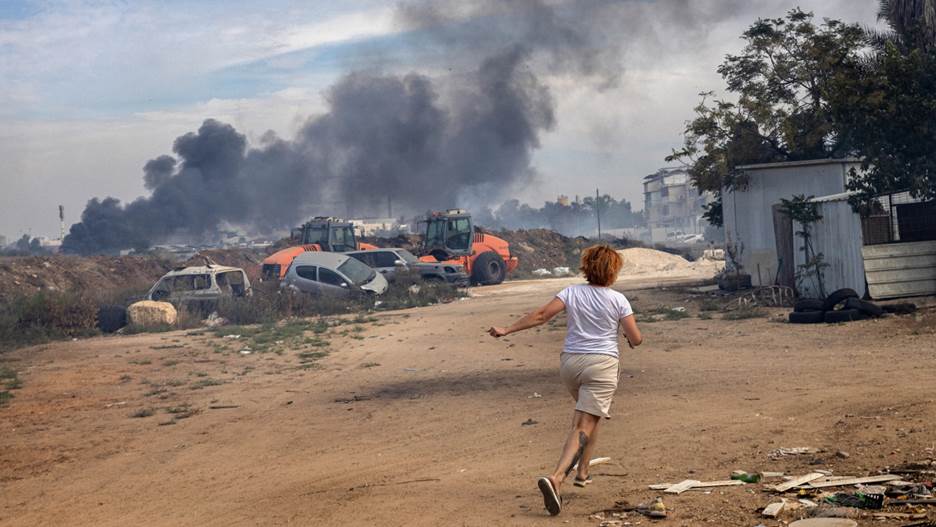
The Israeli war with Hamas is not new. But it has entered a dangerous new phase of escalation - Photo The New York Times
Hamas-Israel War
By Nayyer Ali MD

In a surprise attack on October 7, Hamas unleased a wave of assaults into Israel from the Gaza Strip. Israeli intelligence completely failed to anticipate this attack, which involved the coordinated use of thousands of rockets, followed by explosives that breached the border wall and waves of gunmen in trucks that entered Israel. While the rockets, which are crude and mostly miss, caused some loss of life in Israel, it was the gunmen who were able to inflict major casualties. Over 900 Israelis were killed, mostly civilians, and over 100 were taken as hostages back to Gaza. Another two to three thousand Israelis were wounded. Israeli airstrikes on Gaza have already killed several hundred Palestinians, but the worst is still to come.
While tactically this operation probably exceeded even Hamas’s own hopes of success, it is both morally and strategically already a failure. The deliberate killing of civilians is a war crime, and Hamas is certainly guilty of that. This attack also achieves nothing in terms of justice for the Palestinians or an end to the 56 years of occupation.
The roots of this assault lie in the failure of the Oslo Accords that created the Palestinian Authority and commenced negotiations to resolve the Israeli-Palestinian conflict. In 1993 the PLO headed by Yasser Arafat and Prime Minister Yitzhak Rabin of the left-wing Labor Party signed the Oslo Accords. This set in motion a process of gradual Israeli withdrawal from Palestinian towns and cities in the territories occupied in the 1967 War (Gaza and the West Bank) while the two sides were to actively negotiate a final status agreement within five years that would end the conflict. The PLO recognized Israel’s right to exist as part of this deal.
Unfortunately, the Oslo process was a failure. It failed for two reasons. First, it was deliberately murdered by a fanatic right-wing Jew who assassinated Rabin in 1995. This was done in a climate where Rabin was being vilified for wanting to end the conflict with the Palestinians. Without Rabin, there was no one strong enough and dedicated enough on the Israeli side to realize the goal of Oslo. Instead, the Israeli voters put Benjamin Netanyahu in charge, who was a right-wing hardliner completely opposed to ending the occupation and settling the conflict. Instead of a final deal within five years, the Oslo process gradually petered out and failed. The PLO maintained its grip on the West Bank, but in Gaza, the militant Hamas group was able to grab power in 2005, and has been in charge since.
Instead of coming to a deal with the Palestinians, the Israelis decided to abandon their position in Gaza and pull out their troops, leaving the tiny Gaza Strip surrounded and under stiff blockade. In this power vacuum Hamas has thrived.
The other reason that Oslo failed is that neither the Israeli nor Palestinian leadership were willing to state clearly what a settlement would mean in the real world. For Israelis, no Prime Minister, even Rabin, stated clearly that the Palestinians would get their own state, and that Israel would have to fully withdraw from the West Bank and remove its illegal settlements, which now house over 500,000 Israeli Jews. For the Palestinians, Arafat never clearly stated that a final deal would mean giving up on 78% of Palestine that would belong to Israel, and that the Palestinian refugees, most of whom are the descendants of Palestinians ethnically cleansed in 1948 when Israel was created, would not be able to return to their homes. The best they could get is financial compensation. Israel’s bad faith in the Oslo process was clearly demonstrated by the fact that no Israeli government ever stopped building illegal settlements in the West Bank, the very territory that was supposed to form a Palestinian state. These hard truths, which both sides refused to state clearly to their own peoples, meant that both sides could persist in fantasies about how this conflict ends.
With Oslo failed, there has been no Plan B. While the US under Obama was committed to a two-state solution, Obama never pressured Israel to actually do anything. Under Trump, the US gave up on the Palestinian issue, and Trump’s dilletante son-in-law Jared Kushner spent his time getting a useless agreement between Bahrain, the UAE, and Israel signed. Meanwhile, in Israel the political scene has been dominated by the right, with Netanyahu serving as Prime Minister for over a decade now. He has never offered any answer to the Palestinian question. The Israeli position has been that the Palestinians can be kept subjugated and confined forever, and neither the international community, nor the Palestinians are in a position to challenge that.
What this assault by Hamas has shown is that this approach has its limits. Without direct Israeli control over Gaza, Hamas has been able to put together this complex assault. Now the Israelis are faced with some difficult choices. One option is to double down on the existing policy. Reinforce and militarize the border with Gaza, remove its own civilian population from the nearby vicinity, and choke Gaza with blockades on electricity, water, and food. But with almost a thousand dead Israelis, it is unlikely this will suffice politically. The other option is to invade Gaza and kill and dismantle Hamas. Such an approach, in a small tract of land with 2 million people, will lead to appalling loss of life and devastation. In the end, Israel will prevail in a military sense, but then how does it control and administer Gaza? It would need to permanently deploy 25-50 thousand soldiers on occupation duty, who would be subject to ongoing attacks and suicide bombings. Just the sort of things that forced Israel to withdraw from Gaza in 2005.
The third option would be to seriously consider how this conflict actually ends. While a military response from Israel would still take place, there would need to be an understanding that this problem has no military solution. We would come full circle, back to 1993 and the idea of a two-state solution.
The Palestinians have always had a weak hand. But they have played their weak hand very badly. With poor leadership, they have been unable to bring an end to the occupation, which is essentially a form of apartheid. Even now, the Palestinians remain deeply split between Hamas in Gaza and the Palestinian Authority (essentially the successor to the PLO) in the West Bank. The PA lacks democratic legitimacy as no elections have been held by the Palestinians in decades. The elderly Mahmoud Abbas, who succeeded after Arafat’s death 20 years ago, offers the Palestinians no vision.
The Israeli war with Hamas is not new. But it has entered a dangerous new phase of escalation. What happens next is impossible to predict, other than to say that many more innocent people are going to die. The occupation, for now, will continue.

